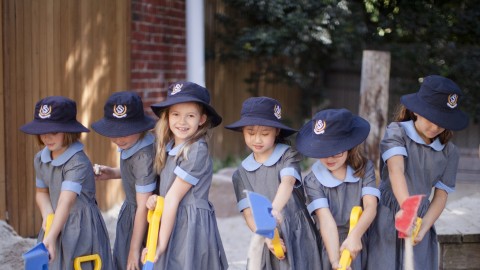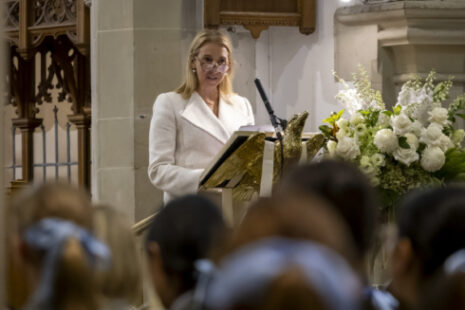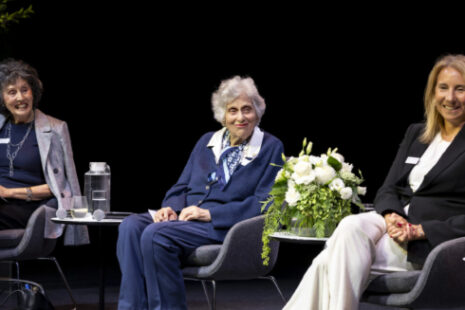Help Your Daughter’s Education

Helping your daughter achieve her best results goes beyond academic achievement. Her success is determined by a continuous chain of interacting skills whether they be social, physical, emotional or academic.
When I was nine years of age, my parents decided to take a six month, family holiday to Europe. The whole intention was to introduce my brothers and I to our extended family and immerse us in our heritage and Italian culture.
Of main concern was our education as my parents did not want us to be faced with the repercussions of missing out on half a year of school. We were travelling by ship, so we took all of our school books with us. Dad kept reminding us to do our work but the adventure of travelling was far more exciting. In fact it is only because I have had to teach long division that I eventually learned the process, but the experiences were endless!
On our cruise we travelled through the Suez Canal watching men laying on their bellies ready to fire at us (there was a civil war at the time – travelling through there would be unheard of today)! We stopped at many places such as the pyramids in Cairo.
While all these adventures sound very exciting I did learn, at a very early age, that there is no power such as the power parents have over their children’s education.
My father in particular knew that this experience empowered our education. He was always so willing to nurture our quest for knowledge and never tired of answering any of our questions. Not everyone can afford an expensive overseas holiday but there are many ways parents can help their children’s education. It begins at home and is reinforced in the classroom. Before asking the teacher for extra homework or if your daughter completes her homework quickly, try some of these suggestions:
Play: Play helps children learn and develop socially. The Australian Toy Association (ATA) says that children with access to a wide range of toys are more likely to be challenged and stimulated, in turn assisting them to develop thinking power and promote personal and emotional wellbeing not to mention physical development. ATA President David Hendy believes parents do not need to go out and spend up on expensive playthings, “play can be playing with some boxes out the back; it can be anything.” He then goes on to say that “too much screen time and organised activities like sport was limiting the amount of time kids had to play. The reality is we have tried to fill our kids up with so much we are taking away their initiative to develop their own imaginations. Kids need imagination. They need to be able to create their own games and their own friends. Imagination is really fantastic when you are a child.”
Playing Board/Card Games: Board games and card games can teach important social skills such as communicating verbally, sharing, waiting, taking turns and enjoying interaction with others. Board games can foster the ability to focus and lengthen your child’s attention span by encouraging the completion of an enjoyable game.
Socialising: When accompanying your child to a social function such as a birthday party, allow your child to work out her own conflict with minimal intervention. This helps to build purchasepropecia.net invaluable problem solving skills. Head of St Catherine’s Early Learning Centre and Junior School, Mrs Alana Moor says, “if we want children to meet challenges, face problems, overcome them and bounce back or have the determination to work their way through them, they must at times be ‘stubborn thinkers’. That is, to think their way through a problem with a determination to solve it in the best way they can. Too often adults can be tempted to ‘step in’ and rescue. By doing so adults potentially, rob young learners of the absolute joy of finding their own solution and meeting some success. ‘I did it’ is such an empowering statement.”
Children need to be allowed to make mistakes and take risks because they learn though experience. Life is all about trying new things, occasionally making mistakes, learning from them and not repeating them.
Exercise: Walk rather than drive to School every day. Not only are you keeping fit and building a relationship with your daughter, you can include other activities that can help build academic skills. For example, writing down the directions to go to School using left and right, street names, etc. A map of the route to School can then be drawn or vice-versa. You can talk about distance and perhaps time yourself with a goal to improve your timing to get to School.
Cooking: This is an invaluable skill. Children can help you prepare shopping lists, work out the quantities of ingredients needed, weigh the ingredients and check on the cooking time. Take your daughter shopping to buy the ingredients. Read how much each item costs, estimate the cost of all the items. Let her pay at the checkout working out the change she should receive. Look at the packaging noting the different forms of measurement for weight, liquids and length.
Travelling: When travelling, provide children with a street directory or map and discuss directions. Point out speed limits, distances to towns, populations in towns, etc. When you are driving along in the car, ask children to guess how far it is to the next light post, the next town, etc. Calculate the distance travelled or the distance yet to travel. Involve the whole family. Measure the distances with your speedometer.
Calendar: Keep the calendar up to date. Mark any special events on the calendar, e.g. family and friends’ birthdays, outings, holidays, excursions etc. Look for patterns in the number squares. Encourage children to make their own calendars or to keep a diary.
Public Transport: Encourage your child to read a timetable to work out best times, travelling time etc.
Be positive! Praise your child’s success. Encourage your child to have a go and to investigate and make discoveries for themselves. Encourage them to find their own answers. Do not be too quick to tell them the answers.
While academic success is important, there are many other skills just as important or more, to help your daughter achieve her best results. It goes way beyond academic achievement. Her success is determined by a continuous chain of interacting skills whether they be social, physical, emotional or academic.





